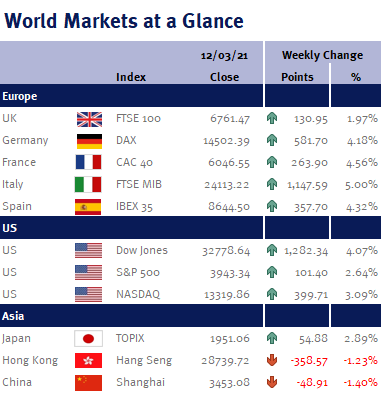Given the US President, Joe Biden, yesterday (Thursday 11 March 2021) signed his $1.9tr fiscal stimulus bill into law, meaning that qualifying Americans (those earning less than $75,000 individually or married couples earning less than $150,000) will each start to receive their $1,400 cash payment in the coming days, coupled with this pledge to have all Americans vaccinated by May, inflation and interest rates were again the hot topic of the week.
While on the surface, it may seem reasonable given an economic reopening is in sight that these $1,400 payments could mean we are in for a period of higher inflation that will force the Fed (and other central banks around the world) to start increasing interest rates, however we believe that the market is getting well ahead of itself.
For starters, despite the fact that we are all like a coiled spring, just waiting for lockdown restrictions to be lifted, we believe that the majority of those qualifying Americans are unlikely to splash their cash on exotic holidays or other extravagancies, but instead use their $1,400 on boring, real-life things, such as paying their mortgage, their bills or reducing their debt levels.
Secondly, although we fully expect to see a rapid bounce in the economy, economic slack will remain elevated as unemployment levels are likely to remain well above the pre-coronavirus outbreak levels for some time to come – which will restrict wage growth. And it should be noted that even if employment levels were to immediately return to pre-coronavirus levels, those levels of employment weren’t generating runaway levels of inflation.
And thirdly, as we have said previously in these Market Summaries, with the exception of the year-on-year pass-through of last year’s distorted oil price in the coming months which will temporarily push headline CPI inflation above 2%, global inflationary pressures remain subdued – and as such higher interest rates remain many, many years away.
In fact, we believe that these subdued inflationary pressures were clearly highlighted in Wednesday’s (10 March 2021) US CPI data. While the headline inflation rate rose to 1.7% from 1.4%, the core rate (which excludes volatile items such as food and energy) actually fell to 1.3% from 1.4%!
Elsewhere, following the European Central Bank’s monetary policy meeting, policymakers also indicated that the market is prematurely expecting higher interest rates as they stated that Eurozone interest rates will stay “at present or lower levels until inflation is near their [2%] goal”.
In the UK, the economy shrank by 2.9% in January. While this reading was much better than the 4.9% contraction expected by the major economists, it wasn’t to us. While we expected a contraction given the coronavirus lockdown restrictions on the retail and hospitality sectors, as we have previously stated, other sectors within the economy have adapted well to the lockdowns and therefore have not been affected to the same degree as they were during the first lockdown last year. Additionally, the UK economy has been helped by improving consumer and business sentiment thanks to the success of the UK’s vaccination program.
Looking ahead to this coming week, we will be focused on the monetary policy meetings at the Fed, BoE and BoJ given the current market speculation regarding higher inflation and interest rates.
Elsewhere, we have US and Chinese retail sales; US and Chinese industrial production; US housing; and of course, the weekly US jobless claims.
Investment Management Team


